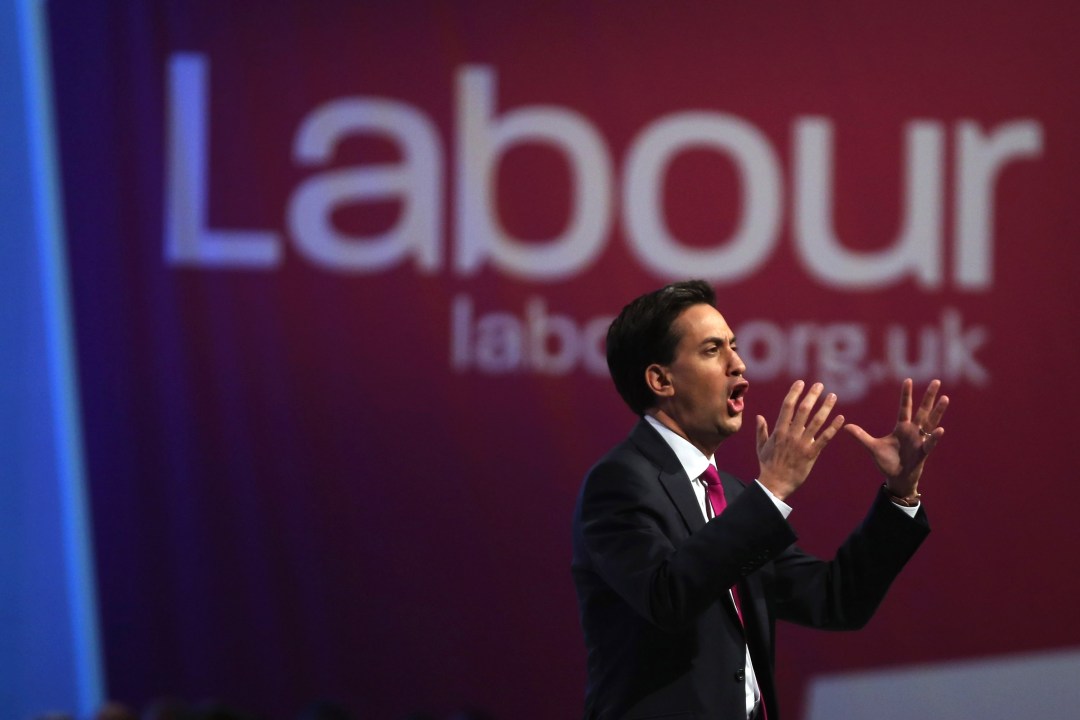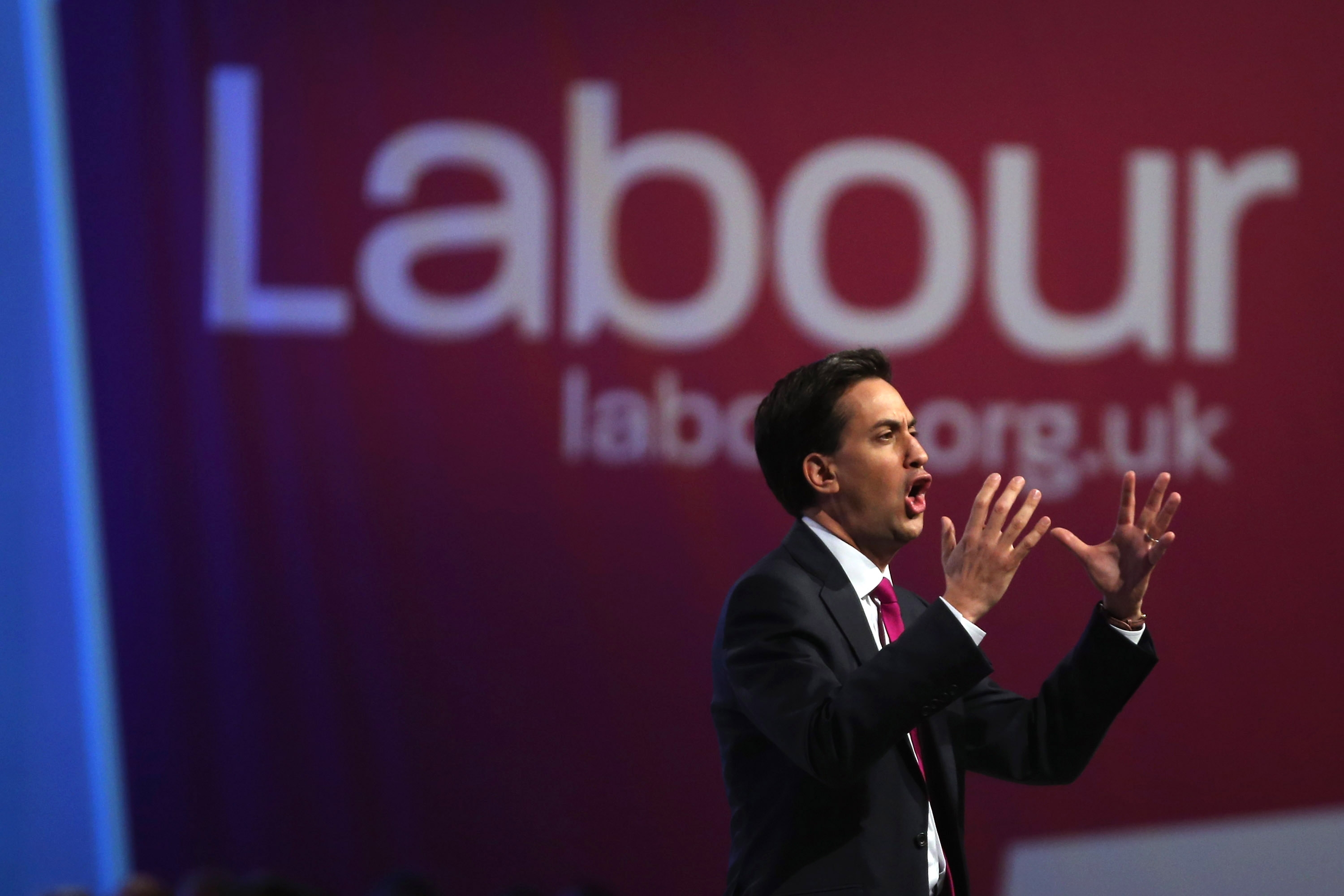The first thing to remember about Ed Miliband’s speech to the Labour conference today is that it’s not about you, it’s about us. That is, it was designed to persuade the media to give Miliband a fresh look more than it was an attempt to impress the general public, far less the Labour members gathered in Manchester.
Initial impressions are that he succeeded in this aim. See Tim Shipman and Fraser Nelson, neither of whom are normally considered much of a Milibander, for good examples of this reappraisal. (John Rentoul is, of course, an exception.) Indeed, I can’t recall when the British half of my twitter timeline was last quite so impressed by any speech given by any British politician, far less any intervention made by Edward Miliband Esq.
The second thing to note is how American his speech was. Criticising it for failing to offer much in the way of policy rather misses the point. The next election may be three years away. There is ample time for policy in the future; a thematic address designed to help voters develop an idea of Ed the Man is surely more useful at this stage of the political cycle. (By some reckoning, mind you, this was the third such “This Is Who I Am” speech Miliband has given. Well, as a man in a cave* once concluded: Try, Try and Try Again.)
Miliband’s speech also had that American quality of making the banal stuff of everyday life seem a fresh and heroic voyage of Columbian proportions. Thus Ed was born and in a hospital no less! And Ed went to school! Just an ordinary school of the kind attended by 90% of children but no less heroic for that!
And then, of course, there were the lessons learnt from mum and dad and all the other normal things. Now, actually, Ed’s break with his father’s politics was deftly handled. Nevertheless these parts of his speech were loaded with American-levels of saccharine.
If that was American then so too was the reminder of how far the Milibands had travelled. Like many a speaker at many an American political convention Ed is the son of immigrants. Since his father was an intellectual Ed couldn’t quite claim a hardscrabble upbringing of the sort that enabled him to value the dignity of labour from a first-hand – as opposed to a theoretical – perspective but, nevertheless, his nod to immigration was a good one and only slightly spoilt by later references to wanting to “protect” British workers from future immigrants.
Much has already been made of his attempt to wrap himself in a One Nation cloak. I’m not sure it’s really terribly daring to offer a word of two of praise to Benjamin Disraeli. He’s been dead 140 years. Moreover, it’s hardly as though One Nation is a Tory province. As Hopi Sen points out, Blair was One Nation and so was Hugh Gaitskell.
Gaitskell seems important, not least because there’s a sense in which David Cameron belongs in the Rab Butler Tory tradition. What ho: a new era of Butskellism? And why not: on the great economic questions of our time there’s much less between the parties than either would like you to believe.
It’s true that Miliband is, like Cameron before him, trying to appropriate the middle-ground for his own purposes. There was progressivism on display too. Not Hampstead progressivism, mind you, but the more robust and older American style. Consider this passage:
“I want to talk to all the people of this country who have always thought of themselves as comfortably-off but who now find themselves struggling to make ends meet. They ask, why is it that when the oil price goes up, the petrol price goes up, but when oil price comes down, the petrol price just stays the same? They ask: why is that the gas and electricity bills just go up and up and up? And they ask why is it that the privatised railways can make hundreds of millions of pounds in profit at the same time as train fares are going up by 10% a year? They think the system just doesn’t work for them. And, you know what? They’re right; it doesn’t. It doesn’t work for them because of cosy cartels and powerful interests that government hasn’t cut down to size. I want to talk to them and all the millions of people across the country who don’t think they get a fair crack of the whip. And I want to say to them: yes, our problems are deep, but they can be overcome.
“The deep problems about who Britain is run for and who prospers within it – one rule for those at the top, another rule for everybody else; two nations, not one. I want to say to them today it’s not the Britain you believe in, it’s not the Britain I believe in, it’s not the Britain this party will ever be satisfied with.
“So, friends, we’re going to change it and here’s how. My faith that we can starts with the inner strength of us as a country, because the problem isn’t the British people.
Titter ye not but there’s a whiff of Teddy Roosevelt populism here. True, it’s hard to imagine Ed charging up San Juan Hill and he lacks TR’s brio (though, like TR, he has an unfortunately annoying voice). Nevertheless this is fertile territory for a populist attempt to change the rules of a game many people suspect may – nay indeed must – be rigged against them. It might be the most significant part of the speech, not least because it occupies territory David Cameron could once have claimed for his party.
Granted, there’s one nagging problem with all this: it’s only two years since Labour was in power. It requires a modicum of chutzpah to claim – or, worse, believe – Britain has been ruined since Mr Cameron and his cronies arrived in Downing Street.
So Miliband’s attempt to understand why people voted for Cameron has a small problem he didn’t quite solve in this speech. Namely: the problem was a party and a government in which he served. At a senior level. If Britain needs rebuilding it stands to reason the government in which Miliband served himself must have been a failure.
Nevertheless, this is such a target-rich environment for the opposition that even a useless speech delivered by a political bantamweight could hardly fail to land some blows. Now Miliband may not be a heavyweight but, sure enough, he had some fun at the government’s expense, most notably on debt and the NHS**.
Again, it was mildly startling to see a British politician wrap himself in flag and (non-denominational, abstract!) faith in quite the manner Miliband did today. His peroration risked going too far, I thought, and was another American-influenced aspect of his speech.
Miliband is making two bets. First that the sour memory of Gordon Brown’s government will have faded by the time the next election is held. Like Mitt Romney in the United States he trusts that voters will forget the mess the new guy found himself in when he replaced a tired, discredited ministry. I fancy Miliband’s task is easier than Romney’s not least because Cameron came to power a year later than Obama and arrived with fewer hopes vested in him.
The second bet is that the economy will still be, at best, stagnant in two years time. At present that seems a wager worth making but it’s a reminder, if one is needed, that the terms upon which the next election will actually be set by forces neither the Leader of the Opposition nor the Prime Minister can forecast with confidence, far less control.
Finally: I only read the speech. But, now, watching clips on the news it strikes me as being excruciatingly-badly delivered. So bad you start throwing-stuff-at-the-telly-bad. This may be a minority view, of course.
*Robert the Bruce. But you know that. And there the similarities with Ed Miliband end.
**Speechwriting note. Compare and contrast these two lines from Miliband’s address:
So when David Cameron says you ‘well, let’s just carry on as we are and wait for something to turn up’ don’t believe him. Don’t believe him. If the medicine’s not working, you change the medicine. And I’ll tell you what else you change. You change the doctor too and that’s what this country needs to do.
And:
The next Labour government will end the free market experiment, it will put the right principles back at the heart of the National Health Service
Not that anyone will notice. Just sayin’…








Comments